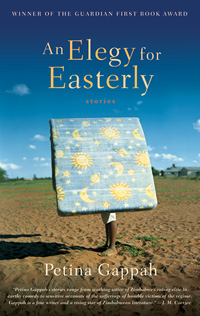You have no items in your cart. Want to get some nice things?
Go shopping My short story diet this week has been An Elegy for Easterly, the debut collection by Petina Gappah, published last year and winner of the Guardian First Book Award. The thirteen stories, set in Gappah’s native Zimbabwe, are portraits of a foreign place full of familiar people.
My short story diet this week has been An Elegy for Easterly, the debut collection by Petina Gappah, published last year and winner of the Guardian First Book Award. The thirteen stories, set in Gappah’s native Zimbabwe, are portraits of a foreign place full of familiar people.
The Zimbabwe of Ian Smith and Robert Mugabe is there in the background of these stories, a country in turmoil, plagued by hyperinflation, corrupt politicians and propaganda-filled newspapers, but these are tales about people, not politics. The stories are sad, angry and funny, focusing on sharply drawn characters and suffused with love for Zimbabwe and frustration at its failings.
It takes a couple of stories to get properly immersed in the atmosphere and emotional turbulence of the collection. The first, At the Sound of the Last Post, told from the point of view of a disillusioned wife at the funeral of her politician husband, is rather a cold opening, and the eponymous second story, dealing with one woman’s desperate need for a baby and the illicit pregnancy of the local madwoman, is perhaps one of the least subtle in the collection. But after this the stories rapidly become deeply moving, full of emotional truth that leaves you breathless.
The stunning endings of stories such as Something Nice From London, in which a family await the arrival of the body of their youngest son from England, and My Aunt Juliana’s Indian, about a the relationship between an Indian shopkeeper and his Zimbabwean employee during the struggle for independence in 1980, stick in the memory. These are stories with twists, but they are twists of feeling, of despair, of fate, rather than of plot.
Gappah’s prose is sparse and economical, pared down to almost the barest observational essentials. But the thoughts and dialogue of the characters are a lyrical hybrid of Zimbabwean Shona and English, making the words on the page dance with life.
It is often the world of African women that the stories inhabit: wives, mothers and daughters tied to husbands, sons and fathers by love, money, tradition or family history. The women in the stories are often trapped in positions of dependence: a maid in a wealthy household, a rich woman with a cheating husband, a student sectioned in a mental hospital. There seems little chance of escape from these confinements, but these women are resilient all the same. They recount stories, pass on traditions, tell jokes, laugh. The voices are angry but never bitter, humorous but never mocking. These are gentle stories full of hard themes, and they will stick around and mutter in your ear long after you’ve finished reading.

About Emily Cleaver
Emily Cleaver is Litro's Online Editor. She is passionate about short stories and writes, reads and reviews them. Her own stories have been published in the London Lies anthology from Arachne Press, Paraxis, .Cent, The Mechanics’ Institute Review, One Eye Grey, and Smoke magazines, performed to audiences at Liars League, Stand Up Tragedy, WritLOUD, Tales of the Decongested and Spark London and broadcasted on Resonance FM and Pagan Radio. As a former manager of one of London’s oldest second-hand bookshops, she also blogs about old and obscure books. You can read her tiny true dramas about working in a secondhand bookshop at smallplays.com and see more of her writing at emilycleaver.net.





Helpful anx a lot coz I had no clue to the text.